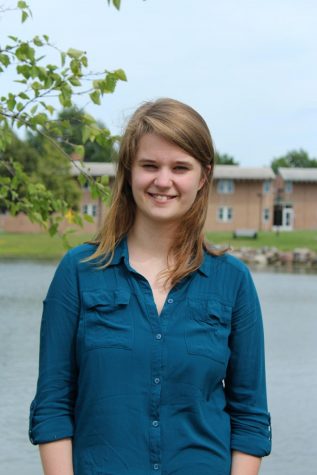Editorial: Is there no urgency in making campus more accessible?
The fall semester of my sophomore year in 2014, I was walking to the restroom in Elliott Hall before my morning class. I held the door for a woman in a wheelchair because there was no automatic button to open it.
I remember how thankful she was, but immediately following her gratitude was a rant.
The clearly frustrated student expressed anger towards Oakland’s campus for not being very handicap friendly.
She talked about that particular restroom door and the parking, reflecting on how there wasn’t enough handicap spaces for her that morning near the building, so she had to park far away.
She added that the door I held for her wasn’t the only one she had problems with — non-automatic doors were an issue she dealt with frequently on campus.
My heart broke for her.
Just last week, students met in Oak View Hall (OVH) to discuss this same issue.
The problem of lack of accessibility for disabled students still exists a year later. Why hasn’t anything been done about it?
According to Ryan Fox and Elijah Sanders, the students leading the way in making changes around campus, Dodge Hall, Hannah Hall, the Mathematics and Science Center — formerly known as the Science and Engineering Building — and Fitzgerald Hall are completely inaccessible.
The Americans with Disabilities Act requires that buildings built after Jan. 26, 1992 be accessible, that’s why this is legal, since these buildings were built before then. But, in my opinion, that doesn’t make it acceptable.
Sanders and Student Body President Nick Walter both said the lack of buttons on both interior and exterior doors is the biggest accessibility complaint.
Not only is maneuvering a chair through a door a hassle, but it’s also potentially dangerous and could result in injury.
Sanders, who is handicapped, also added that the only accessible bathroom in Varner Hall is inconveniently located on the second floor. It’s also been broken for the last year.
Linda Sisson, director of Disability Support Services (DSS), said the only requirement for interior doors is that they weigh a certain amount.
She added that automatic doors are much more welcoming, though, and a goal of DSS is to make everything on campus accessible, regardless of what is legally required.
It costs roughly $6,000 to install an automatic opener on a door, according to Fox.
John Beaghan, vice president for finance and administration at OU, said automatic doors on new buildings are paid via the building’s project budget.
For existing buildings, the money comes from Oakland’s general maintenance fund.
According to the university’s budget, the general fund is $27.7 million for fiscal year 2016.
Another problem is the elevators. Walter said the elevator in the Oakland Center is frequently down and one of the elevators in Varner doesn’t work altogether.
In OVH, the elevator on the upperclassmen side has been down for three weeks. Fox said at one point, two of the three elevators in OVH weren’t working.
What might seem like an inconvenience for you because you have to take the stairs up a flight is a much larger inconvenience for someone who is disabled and isn’t able to take the alternative route.
Sanders said at first, OU had its objections to fixing these changes, but after the meeting last week, the university seems more supportive.
But where is OU’s sense of urgency in fixing these issues?
The goal of this article isn’t to discredit what Oakland already does to accommodate disabled students, but rather to speed up the process of making these additional adjustments.
As students of OU, we’re the ones who will lead the way in this charge. If enough of us express concern and bring awareness to the severity of this issue to administration, change will follow.
One way to do this is by contacting Glenn McIntosh, the vice president of student affairs at OU. His email is [email protected]. The Oakland Post encourages you to be professional when contacting him.
Also, contact a legislator or attend an OUSC meeting, which are held every Monday at 4 p.m. in the Oakland Center, to speak on the issue.
Lastly, report problems to maintenance so things like elevators and restrooms get fixed quicker. Getting maintenance more involved is another goal of Fox and Sander’s efforts.
I think it goes without saying that being disabled comes with its own obstacles. Let’s not make our campus another obstacle for those who have faced enough already.









